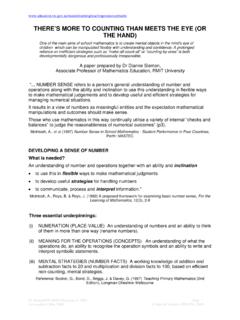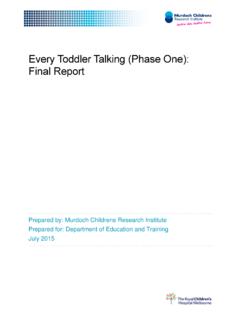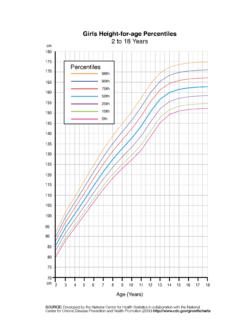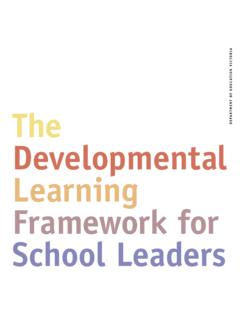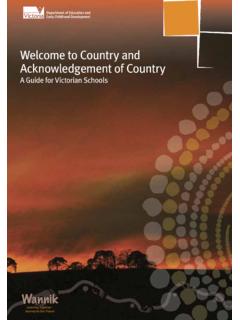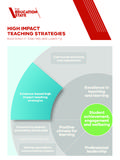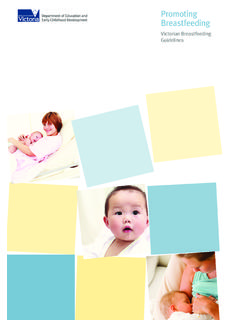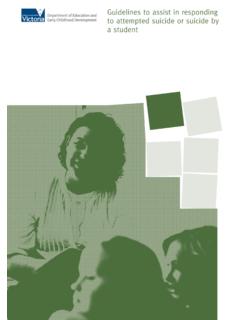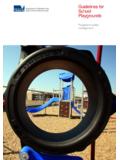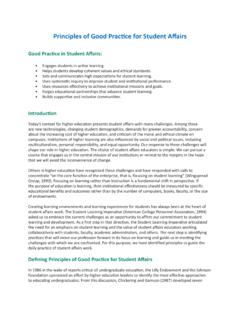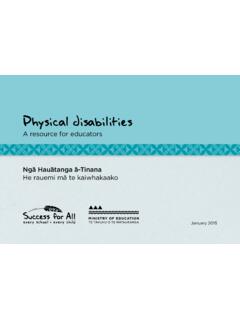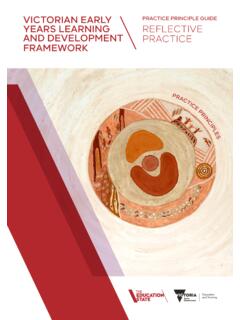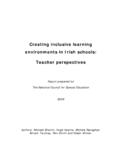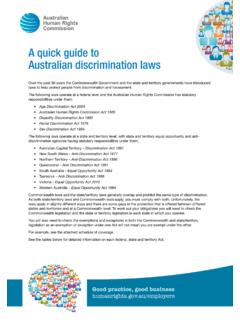Transcription of Practice Principle 2: Partnerships with professionals
1 T Victorian Early Years Learning and Development Framework Evidence Paper Practice Principle 2: Partnerships with professionals Authored for the Department of Education and Early Childhood Development by Rachel Flottman, Amy McKernan & Collette Tayler 2 Practice Principle 2: Partnerships with professionals Contents Executive Summary .. 4 Introduction .. 5 What do we mean by Partnerships with professionals ? .. 6 Why are Partnerships with professionals so important in early childhood learning, development and pedagogy? .. 7 Early childhood development is complex and multi-faceted; requiring professionals in a range of sectors to collaborate so that support for each child s learning and development is integrated and holistic.
2 7 Collaboration enhances the professional learning of early childhood professionals . 8 Effective Partnerships can ensure continuity in learning and development in early childhood.. 9 Effective Partnerships ensure the best use of professionals skills, knowledge and experience..10 How can we achieve best Practice ? .. 11 Early childhood professionals communicate positively with one another to support children s learning and development..11 Early childhood professionals work collaboratively by planning and sharing information with each other ..12 Early childhood professionals share a common goal in supporting the learning and development of children ..13 Early childhood professionals respect and value the expertise of their peers, and know when to make referrals.
3 14 Early childhood professionals are committed to working together to advance knowledge about children s learning and development..15 What are the implications for achieving best outcomes for children? .. 16 Appendix A: Methodology .. 18 References .. 20 3 The Victorian Early Years Learning and Development Framework (Victorian Framework, DEECD, 2009) guides early childhood professionals Practice in Victoria. The Victorian Framework identifies eight Practice Principles for Learning and Development ( Practice Principles). The Practice Principles are based on the P-12 Principles of Learning and Teaching, the pedagogy from the national Early Years Learning Framework, and are informed by the latest research.
4 The Practice Principles are interrelated and designed to inform each other. They are categorised as Collaborative, Effective and reflective : Collaborative 1. Family-centred Practice 2. Partnerships with professionals 3. High expectations for every child Effective 4. Equity and diversity 5. Respectful relationships and responsive engagement 6. Integrated teaching and learning approaches 7. Assessment for learning and development reflective 8. reflective Practice These Evidence Papers document the research that underpins each Practice Principle . The content of the Evidence Papers will be developed into a series of practical guides Practice Principles in Practice which will provide practical advice to early childhood professionals on how to align their Practice to the Practice Principles.
5 4 Executive Summary Practice Principle 2: Partnerships with professionals emphasises the need for early childhood professionals from a range of backgrounds to work together (collaborate) to achieve the best outcomes for children and families (Lumsden, 2005; Bruder, 2010). Partnerships between professionals are important for all children, including children with a disability, developmental delay or other additional needs, who may require the support of professionals across several settings and disciplines (Wesley et al., 2004; King, et al., 2009; Trepanier-Street, 2010). professionals themselves also benefit from working in partnership. Collaboration provides opportunities for professional development through formal and informal learning from peers with diverse experience and expertise (Kelley, 1996; Wesley et al.)
6 , 2001; Rush et al., 2003; Green et al., 2006; McWayne, et al. 2008). By sharing knowledge and experience through collaborative Partnerships with other practitioners, researchers and policy makers, early childhood professionals can contribute to new knowledge about early childhood learning and development. Working in partnership requires professional commitment and respect for one another s roles, experience and expertise, and is the responsibility of all early childhood professionals . Early childhood professionals understand the importance of communicating and planning in collaboration in order to respond to children and to ensure comprehensive, holistic and continuous approaches to their education and care.
7 The implications for Practice informed by the research and detailed in this paper are: Early childhood professionals collaborate; communicating and planning in partnership to achieve best Practice . Early childhood professionals work together across settings to support positive transitions for children. Early childhood professionals are willing to learn from one another. Early childhood professionals understand their own and others roles, and make referrals when necessary. Early childhood professionals are committed to working in partnership to achieve the best possible outcomes for children. 5 Introduction Early childhood professionals are a diverse group, reflecting the complexities of young children s learning, development and health.
8 Practice Principle 2: Partnerships with professionals relates to the importance of collaboration and partnership amongst early childhood professionals , who work together to support children s learning and development. Early childhood professionals are from diverse professional backgrounds. They use multidisciplinary approaches to provide better support to families and draw on the skills and expertise of their peers. Early childhood professionals : work collaboratively to share information and plan to ensure holistic approaches to children s learning and development understand each other s Practice , skills and expertise, and make referrals when appropriate acknowledge the significance of transitions within and across early childhood services and schools, and ensure that children understand the process and have an active role in preparing for these transitions build on children s prior learning and experiences to build continuity for their learning and development from birth to eight years of age.
9 VEYLDF, Practice Principle 2: Partnerships with professionals emphasises the importance of collaboration and partnership amongst all professionals who work with children and their families to support children s learning and development. Early childhood professionals bring diverse cultural, educational and social backgrounds and specialisations that include early childhood education, health, social and emotional development, special education, occupational therapy, speech pathology, psychology and inclusion support. No early childhood professional is able to support children s learning, development and health alone, and all professionals are responsible for seeking opportunities to work in partnership.
10 The term early childhood professional includes any person who works with children between the ages of birth and eight years. It includes, but is not limited to, maternal and child health nurses, all early childhood practitioners who work directly with children in early childhood settings (educators), school teachers, family support workers, preschool field officers, inclusion support facilitators, student support service officers, primary school nurses, primary welfare officers, early childhood intervention workers, play therapists, health professionals and teachers working in hospitals, and education officers in cultural organisations.

